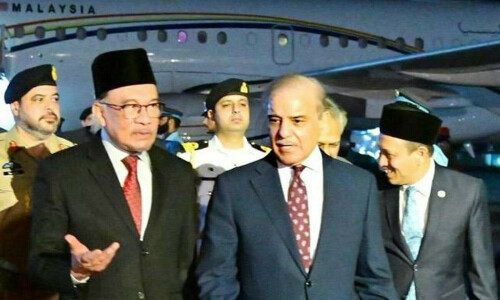An Anti-Terrorism Court (ATC) in Haripur on Wednesday began hearing the Mashal Khan lynching case against 57 suspects indicted a day earlier by the court.
The court held its proceedings inside the Haripur jail's premises, where strict security measures were put in place to avoid a possible confrontation with zealots.
Of the 18 witnesses presented before the ATC, only five policemen could record their statements on the first day of the case's proceedings. The court subsequently adjourned till September 27.
Mashal Khan, a journalism student at the Abdul Wali Khan University in Mardan, was killed in April after a charged mob beat and shot him after accusing him of publishing blasphemous content online.
A report compiled by a 13-member team investigating the incident stated that a group of people in the university had incited the mob on the pretext of blasphemy. The team found no proof that Mashal Khan had ever committed the offence.
The report said that Mashal Khan had been vocal about the rights of students at the university and even challenged the appointment of a new vice chancellor (VC) to ensure that students were able to obtain their degrees, which was not possible without the VC’s signature.
Mashal Khan was murdered in line with a plan allegedly hatched by Sabir Mayar, the president of the Awami National Party-aligned Pakhtun Students Federation (PSF), and Ajmal, the president of the university’s employees association, the report found.
According to the report, Mayar viewed Mashal Khan’s stance against activities on the campus to be a threat to the PSF.
In July, a Peshawar High Court bench had ordered the transfer of the high-profile case from Mardan to the Abbottabad ATC.
A bench comprising Chief Justice Yahya Afridi and Justice Ishtiaq Ibrahim issued the order over an application submitted by the Khyber Pakhtunkhwa home department seeking transfer of the case from Mardan due to security reasons.
The home department had applied to the chief justice for shifting trial of the lynching incident under Section 28 (1a) of the Anti-Terrorism Act, 1997.
A writ petition was also filed by Mashal Khan’s father Iqbal Khan for transferring the case to any other district from Mardan.
He stated that the open trial in a matter of a very sensitive nature was not possible and therefore the trial should be conducted inside the jail to protect witnesses, lawyers and judges from any harm.
Iqbal Khan also requested the high court to pay his lawyer’s fee and asked the Supreme Court to provide protection to his daughters, who haven’t been to school since Mashal Khan’s murder.














































